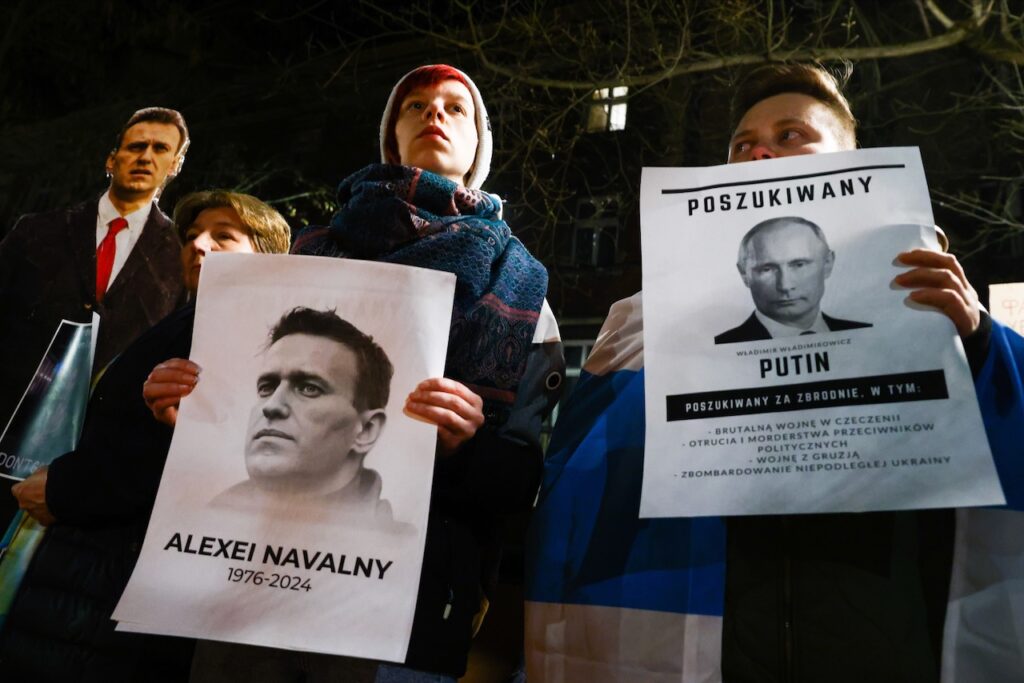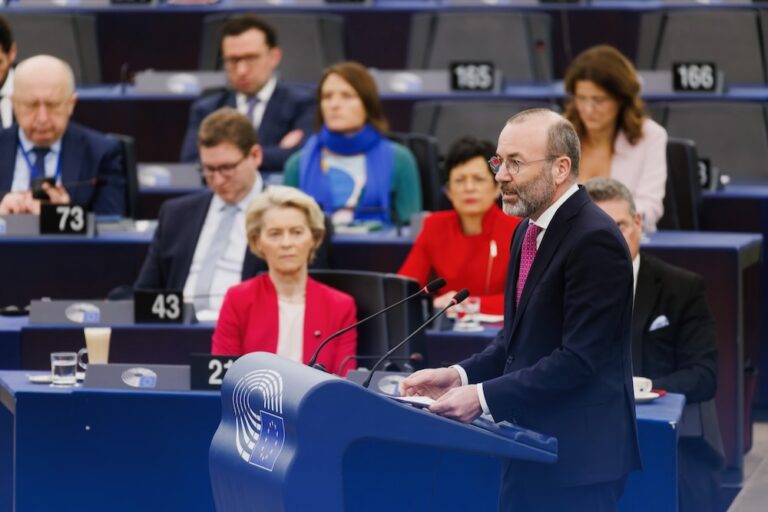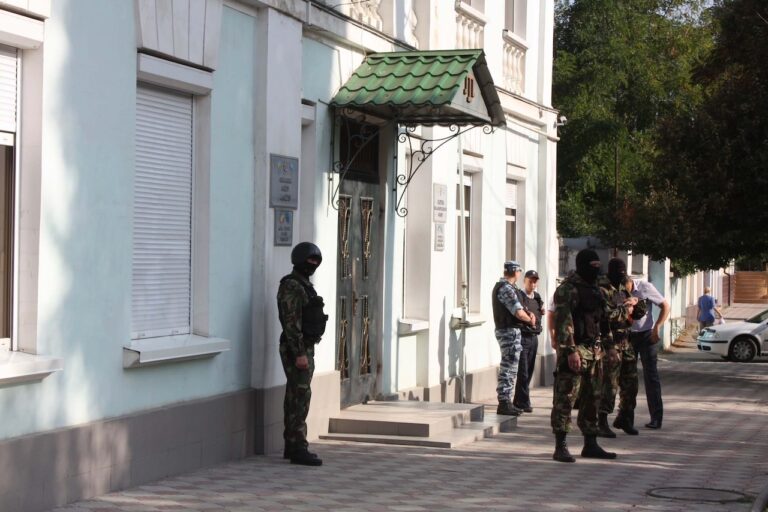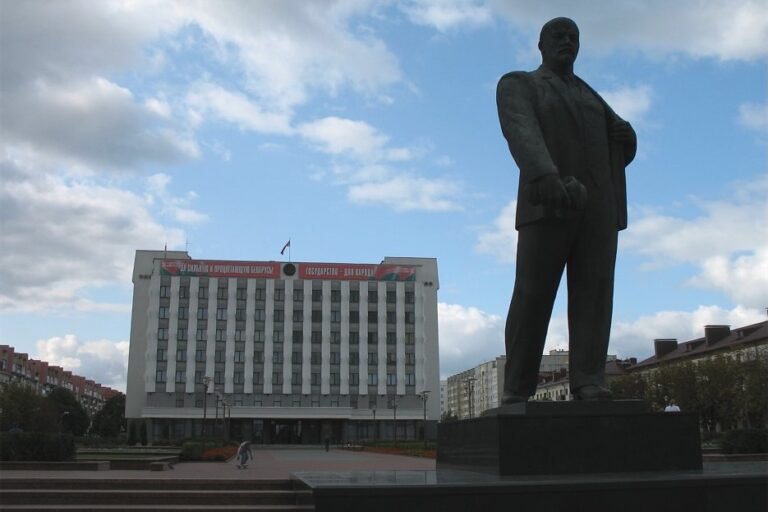February 2024 in Europe and Central Asia: A free expression round up produced by IFEX's Regional Editor Cathal Sheerin, based on IFEX member reports and news from the region.
The impact on Ukrainian journalism of Russia’s two-year war on Ukraine; outrage at ill treatment and death of political prisoner Alexei Navalny; solidarity with jailed US extradition target Julian Assange; ‘foreign agent’ bill moves ahead in Kyrgyzstan; threat to rule of law in Greece; EU Parliament adopts Anti-SLAPP Directive.
Two years of Russia’s war on Ukraine
Russia’s illegal war against Ukraine marked its second anniversary on 24 February, with little sign of the conflict coming to an end soon.
According to the UN Human Rights Monitoring Mission in Ukraine, there have been 30,457 civilian casualties in the country since the start of the war. This figure comprises 10,582 killed and 19,875 injured; it also includes 587 killed and 1,298 injured children.
The price paid by journalists covering the conflict has also been intolerably high. Regional IFEX member, the Institute of Mass Information (IMI), has recorded 567 crimes committed by Russian forces against journalists and media in Ukraine since the war began. This includes: the killing, injuring and abduction of journalists; firing on members of the press; shelling media offices; death threats; and cyber attacks.
According to IMI, at least ten journalists have been killed while reporting on the war, 24 have been kidnapped and 14 are currently missing.
The International Press Institute (IPI) reminded us in February that at least 17 Ukrainian journalists are still being held behind bars in territory occupied by Russian forces. IPI’s Ukraine War Press Freedom Tracker has recorded over 1,250 attacks on the media in Ukraine and Russia as a result of the war: the overwhelming majority of these attacks have been carried out by the Russian authorities, Russian forces or other pro-Russian entities.
Members of the Media Freedom Rapid Response platform marked the second anniversary of Russia’s invasion by publishing a statement of solidarity with Ukraine’s journalists, in which they called for “continued international support for Ukrainian media” and demanded that Russia “comply with international humanitarian law”, “refrain from all attacks on journalists” and investigate those attacks on journalists in which its forces are implicated.
Several IFEX members have been working to support media in Ukraine since the start of the war. In the last two years, Reporters Without Borders (RSF) and IMI have assisted more than 1,500 Ukrainian and international reporters, and 150 different media outlets. This includes the provision of financial and psychological support, safety equipment and training, and journalistic equipment.
Free Press Unlimited, via its Media Lifeline Ukraine initiative, has supported nearly 1,100 Ukrainian journalists and fixers. As well as providing safety equipment and assisting in relocating journalists to safer areas, Free Press Unlimited has set up a media hub for exiled Ukrainian journalists in Poland, from where they can continue their work.
Alexei Navalny dies in Siberian prison
On 16 February, the anti-corruption campaigner and prominent opposition leader, Alexei Navalny, died in his Siberian prison. Some of the circumstances around his death, including its exact cause, are still being disputed.
Navalny – the victim of an attempted near-lethal poisoning in 2020 – was serving a prison sentence of over 30 years on several dubious charges. The Russian authorities had cracked down on his anti-corruption organisation in recent years, outlawing it as “extremist” in 2021. Several members of his circle – including his lawyers – have been targeted with “extremism” charges.
Before his death, Navalny appeared to be healthy, even though he had suffered long-term harsh treatment in prison. In 2023, his supporters launched a campaign to oppose Vladimir Putin’s re-election as president in March 2024; Navalny himself had issued a statement calling on Russians to vote against Putin.
Human Rights Watch (HRW) laid the blame for Navalny’s death fully at the Kremlin’s door:
“For more than a decade the Kremlin persecuted, imprisoned, and tormented Navalny. He should never have been in prison, in the first place. The Russian authorities bear full responsibility for what has happened to Navalny, starting with his first politically motivated arrest” – HRW
Navalny was frequently, and very simplistically, depicted as a liberal hero in western media and politics. The reality was much more complicated and, at times, problematic. His death once again brought to the surface some unsavoury aspects of his past, including racist comments made years ago and a flirtation with far-right groups. It is unclear to what degree (if at all) Navalny rejected these positions in his later life. I discussed this troubling aspect of Navalny’s past in more detail in my Europe and Central Asia brief for January 2021.
However, the value of Navalny’s anti-corruption work and his criticism of Putin’s repressive government is not in doubt. Neither is the fact that his imprisonment was absolutely politically-motivated.
In the days following his death, nearly 400 of Navalny’s supporters were arrested across Russia for peaceful acts of public mourning.
Navalny’s death, which took place one month before the scheduled presidential election, put the spotlight on other imprisoned opposition leaders in Russia, such as pro-democracy activist Vladimir Kara-Murza. In late February, Freedom House and others wrote to US President Biden calling on him to “accelerate your efforts” to secure Kara-Murza’s release. Kara-Murza has also been the target of a suspected poisoning. He is currently serving 25 years in prison for his criticisms of Russia’s invasion of Ukraine and “treason”.
IFEX members found themselves targeted by Russia’s free expression crackdown in January and February. ARTICLE 19 was declared an “undesirable” organisation, a designation that bans the group from working in Russia and threatens those who work with it with harsh prison sentences. The authorities also placed Iryna Zemlyana, a media expert working for IMI, on Russia’s list of “terrorists and extremists”; Russia opened a spurious criminal case against Zemlyana in 2022, accusing her of “attacking” the Russian ambassador in Poland during an anti-war protest.
News outlet Radio Free Europe/Radio Liberty (RFE/RL) was also designated an “undesirable” organisation in February.
January and February saw the first convictions under the 2023 Supreme Court ruling that banned the so-called “international LGBT movement” by designating it as “extremist”. According to the ruling, the rainbow flag is now an “extremist symbol”. In late January, a woman was sentenced to five days in detention for wearing rainbow-coloured earrings and a man received a fine for posting a rainbow flag on a social media page; in early February, a woman was also fined for displaying a rainbow flag on her social media. HRW warns that “many more convictions may follow”.
At the end of the month, Oleg Orlov, co-chair of Nobel Peace Prize-winning human rights group Memorial, was sentenced to 2.5 years in prison on charges of “discrediting” the Russian army. The charges stem from an article Orlov wrote criticising Russia’s invasion of Ukraine and suggesting that Russia was descending into fascism.
Julian Assange’s fate hangs in the balance
While politicians and members of the media in Europe and the US were vociferous in expressing their justified outrage at Navalny’s ill-treatment and death in Putin’s prison system, noticeably fewer raised their voices for the jailed Wikileaks publisher and US extradition target Julian Assange.
Assange still doesn’t know if he will be allowed a final appeal against his extradition to the US, where he faces up to 175 years in prison if convicted on dubious espionage charges.
A UK High Court hearing where this was to be determined concluded on 21 February with no immediate decision, nor any indication of when this decision might eventually be delivered.
Assange, who has been held in the high security Belmarsh Prison since 2019, was unable to attend the hearing (either in person or via video link) due to ill health.
Ahead of the hearing, several IFEX members, including ARTICLE 19, the Committee to Protect Journalists (CPJ), the European Federation of Journalists (EFJ), Index on Censorship, PEN International, PEN Norway and Reporters Without Borders (RSF) reiterated their calls for Assange to be released and for the charges against him to be dropped.
The charges against him are based on WikiLeaks’ publication of materials in the public interest. Assange’s prosecution in the US, as CPJ’s Jodie Ginsberg said, “would have disastrous implications for press freedom both in the US and globally”.
In addition to the dangerous precedent that extraditing Assange would set, there are serious concerns, as ARTICLE 19 argues, that he “will not be guaranteed a fair and just trial” in the US. Weeks before the February court hearing, the UN Special Rapporteur on Torture called on the UK to halt Assange’s extradition on grounds that “he would be at risk of treatment amounting to torture or other forms of ill-treatment or punishment”.
PEN and RSF were present as observers at Assange’s High Court hearing in London, and joined Assange’s supporters in a show of solidarity outside the court.
RSF’s Rebecca Vincent published two useful “X” threads summarising day one and day two of the proceedings. She also addressed several aspects of Assange’s case in an interview with CNN, including reports that the CIA had discussed assassinating him:
A significant amount of misinformation has been published (or otherwise disseminated) about Assange. Shortly before the High Court hearing, RSF published an article clarifying 12 of the most “common misconceptions” about his case.
In brief
There was very welcome news at the end of the month when the EU Parliament adopted the Anti-SLAPP Directive – also known as Daphne’s Law (after the murdered Maltese journalist Daphne Caruana Galizia). The Directive sets minimum standards for protecting journalists and other public watchdogs against abusive lawsuits commonly known as SLAPPs (Strategic Lawsuits Against Public Participation). IFEX members have spent years campaigning and advocating for anti-SLAPP legislation in Europe. It is now the responsibility of member states to build on the Directive and draft robust national legislation that protects public watchdogs from SLAPPS and goes beyond the minimum standards set by the EU Parliament.
In Kyrgyzstan, lawmakers pushed ahead with the repressive “foreign agents” bill, which passed its second reading in the Jogorku Kenesh (Kyrgyz parliament) on 22 February. The bill, which bears striking similarities to “foreign agent” legislation in Russia, seeks to classify CSOs that receive funding from abroad as “foreign agents” and envisions a special classification for those groups that engage in “political activities”. If passed, the legislation (like similar laws elsewhere) will place an onerous administrative burden on CSOs, stigmatising them and undermining their work. Several international rights groups, including IFEX members, have called for the bill to be dropped.
Earlier in the month, the Kyrgyz Supreme Court ordered the shuttering of leading investigative outlet Kloop Media on the spurious grounds of not having a licence to practise journalism and publishing “purely negative” content that contained “harsh criticism” of the authorities. IFEX had urged the government to drop its lawsuit against Kloop, which came as part of a wider – and still ongoing – crackdown on independent reporting in Kyrgyzstan.
In early February, the European Parliament raised serious concerns over the “threat to EU values” in Greece. Areas of concern that MEPs cited included attacks on media freedom, the use of surveillance and spyware against political opponents and others, police violence, ill treatment of migrants and attacks on civil society. Earlier in the month, IFEX members wrote to EU Commission President Ursula von der Leyen calling for action to be taken to address these threats to rule of law in Greece.
In January, IPI published a report examining media capture in Greece, the lowest ranking EU country for press freedom.



